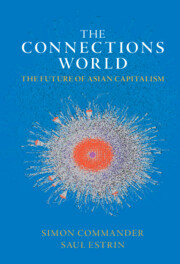‘This excellent book provides a fresh perspective on Asian success, viewing it through the lens of networks and connections, between businesses and between businesses and governments. Using new empirical material and historical data, it argues that while the connections world has played its part in Asian success, it also bears the seeds of major challenges in the future in maintaining the success. The book will be of great interest to researchers and policymakers alike.’
Ravi Kanbur - Cornell University
‘The Connections World is a revealing account of the structures and strengths of Asia's politics and business networks in nurturing development and prosperity. It is also careful to highlight the model's flaws and shortcomings as Asia confronts some very familiar 21st century challenges.’
George Magnus - Oxford University
‘The authors argue convincingly that Asia’s connections world - deeply embedded networks of business groups, powerful families, and governments - contributed materially to its remarkable economic success with mostly extensive growth these past 40 years, by substituting for missing markets and weak formal economic, social and political institutions. This connections world is likely to become a serious drag on further economic progress now that many of Asia’s successful economies have entered the stage of intensive, innovation-driven growth. There is too little competition and rivalry, entry and exit and creative destruction. Required reading for all those interested in the political economy of sustainable economic growth for the rest of this century in Asia and elsewhere.’
Willem Buiter - Columbia University
‘This is a terrific book, from which I learned a great deal. A considerable feat of scholarship, yet refreshingly jargon-free, it would be valuable for its information alone. But it offers much more besides. It provides a powerful analytical and empirical appreciation of the power of networks and the ways in which they have shaped Asian economies and businesses, with major implications for the region's prospects.’
John Llewellyn - Llewellyn Consulting & Former Chief Economist, Lehman Brothers
‘In the recent competition between liberal and political capitalisms, the latter, exemplified primarily by China, has displayed higher economic growth. Relative economic power has shifted towards the Asian giants. In this timely book which X-ray-like looks at the ‘insides’ of the Asian model, Commander and Estrin present a much more informed and nuanced view than the usual ‘crony capitalism’ dismissal. The Asian capitalism based on family, connections, trust among the insiders, and porous relations between the state and the private sector might succumb to corruption, but it may also show itself to be more nimble than its Western counterpart.’
Branko Milanovic - Author of Capitalism, Alone
‘… the case for reform expressed in the book is compelling.’
Nigel Driffield
Source: LSE Review of Books (https://blogs.lse.ac.uk/lsereviewofbooks)
‘Recommended.’
A. A. Batabyal
Source: Choice



